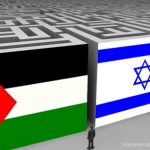Saturday
Mar132010
Israel's Deputy Ambassador in Birmingham: Challenges, But Where is the Hope?
 Saturday, March 13, 2010 at 6:39
Saturday, March 13, 2010 at 6:39  On Thursday, Israel's Deputy Ambassador to Britain, Talya Lador-Fresher, "Challenges and Hopes in the Middle East" to an University of Birmingham audience.
On Thursday, Israel's Deputy Ambassador to Britain, Talya Lador-Fresher, "Challenges and Hopes in the Middle East" to an University of Birmingham audience.For her first challenge, Lador-Fresher chose the 2008/9 Gaza War. This had been "successful" since life in southern Israel is becoming normal and Egypt's eyes have been opened so it no longer allows smuggling through almost 150 tunnels.
Challenge #2 is that the Fatah Party of Mahmoud Abbas and Salam Fayad do not represent the majority of Palestinians since Hamas is controlling the Gaza Strip. Hamas poses Challenge #3 is that Hamas is killing and hiding among the civilian population and then crying as if they have done nothing. (Lador-Fresher stated that both the Goldstone Report and the Human Rights Commission of the United Nations are biased against Israel on the Gaza issue.)
Those challenges put Lador-Fresher's professed "hope" for a two-state solution into context. She proclaimed, "There is no humanitarian crisis in Gaza. People are not suffering," and continued, "We will not help and assist economic development in Gaza." This was in sharp contrast to Lador-Fresher's statment of a policy to assist the West Bank's economic growth.
On the same day, UN humanitarian chief John Holmes said that Israel's blockade of Gaza is not helping its security or weakening Hamas' hold on the territory. Yet, when Lador-Fresher was reminded by a student that trucks going inside Gaza are prohibited from carrying important items such as spare parts of machines or construction materials, she said blithely that Gazans have heat, gas, and electricity.
This claim of Israeli generosity sits alongside a recent articlethat daily power cuts cost lives in Gaza. Her declaration that Egypt can assist Gazans if they wish, since one third of Gaza's border is surrounded by Egypt, co-exists with the Israeli applause for Cairo's efforts to place underground metal plates over the tunnels, as well as its fence standing along Gaza's southern border.
And asked about white phosphorous bombs dropped on Gazan civilians, Lador-Fresher replied, "Yes, it is not pleasing but many Western countries use it."
Strange juxtapositions, accompanied by misperceptions. The Deputy Ambassador said she did not understand why some Palestinian mothers crave their children to be shaheed (martyr), but she then explained that "the meaning of shaheed is a murderer, a terrorist". In fact, the meaning of shaheed in Islam is the one who is killed on the path of God, not the one killing civilians and himself. Indeed, suicide is strictly forbidden in this religion.
So from the challenges set forth by Lador-Fresher, we get her own challenges --- as a spokeswoman for Israel --- of empty assurances, declarations of bias, and distortions. Where in this is "hope"?




